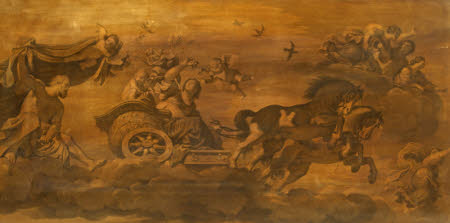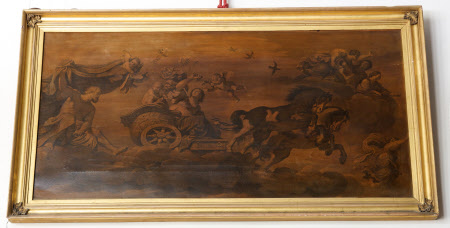Aurora quitting Tithonus in her Chariot
after Guercino (Cento 1591 – Bologna 1666)
Category
Art / Oil paintings
Date
1800 - 1899
Materials
Oil on canvas (grisaille)
Place of origin
England
Order this imageCollection
Lacock, Wiltshire
NT 996365
Caption
Aurora, goddess of dawn, is shown leaving her aged husband, Tithonus, in her horse-drawn chariot. She holds a torch aloft, rolling back the clouds, turning night into day, preceded by a group of maidens, the Horae, goddesses of the Seasons. This grisaille (monochrome) is after the fresco of 1621 in the Casino di Villa Boncompagni Ludovisi in Rome, Italy. It was probably copied from an engraving, an example of which is at Dunham Massey.
Summary
Oil painting on canvas (grisaille), Aurora quitting Tithonus in her Chariot, after the fresco by Guercino (Cento 1591 – Bologna 1666) of 1621 in the Casino di Villa Boncompagni Ludovisi (Casino dell'Aurora), Porta Pinciana, Rome, Italy. A classical scene, featuring a chariot, and winged putti in muted brown colours. It is probably copied from the engraving, an example of which is at Dunham Massey (NT 930303). As related in Homer’s epic Greek poem, Iliad (XI) Aurora, the goddess of dawn, kidnapped four men, Cephalus, Clitus, Ganymede and Tithonus, to be her lovers. Ganymede was later stolen from her by Zeus, disguised as an eagle, to be his cup bearer and Cephalus longed to return to his mortal wife Procris, so Aurora finally released him. Her favourite was Tithonus, son of Laomedon and brother of Priam. Zeus granted him immortality but, cruelly, not youthfulness. Here he is shown here sitting on a cloud as an old man whilst Aurora drives away from him in her chariot. Winged putti bestow flowers, symbolising the sun's generative power and three maidens precede her, one of whom holds an urn, symbolising the dawn's dew and referring to the death of one of their sons, Memnon, who was killed by the mighty Greek warrior, Achilles, in the Trojan war. Aurora is so distraught by his death that her tears cover the earth as she flies across the skies every morning.
Provenance
Given by Matilda Theresa Talbot (formerly Gilchrist-Clark) (1871 – 1958), who gave the Abbey, the village of Lacock and the rest of the estate to the National Trust in 1944, along with 96 of the family portraits and other pictures, in 1948
Credit line
Lacock Abbey, The Talbot Collection (National Trust)
Makers and roles
after Guercino (Cento 1591 – Bologna 1666) , artist

